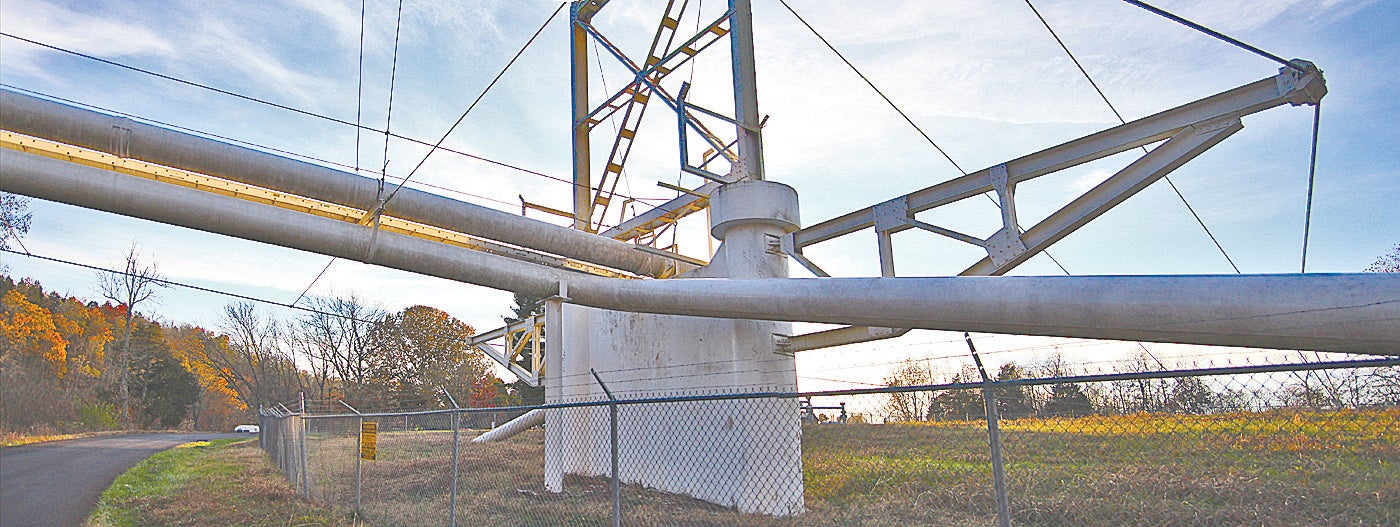Tennessee Gas still has NGL pipeline plan on hold
Published 9:10 am Thursday, December 28, 2017

- (File photo/Ben Kleppinger) The Tennessee Natural Gas pipeline 100-1 is seen from the Boyle County side of Herrington Lake. Energy infrastructure company Kinder Morgan, which owns Tennessee Natural Gas, wants to repurpose the pipeline to carry natural gas liquids from the northeast to the gulf coast.
Plans to repurpose a natural gas pipeline that runs through Boyle County are still on hold while the pipeline owner works “to confirm the degree of market interest in the project,” according to the most recent filing in the case.
Tennessee Gas Pipeline Company filed a “notification regarding status of implementation plan” document on Dec. 21, stating that it’s not ready to begin repurposing a 964-mile stretch of natural gas pipeline, about 30 miles of which run through Boyle County, to carry natural gas liquids (NGLs), byproducts of fracking in the northeast.
“As mentioned in the acceptance letter (filed by Tennessee Gas on Oct. 30), due to the length of time that has passed since Tennessee filed its application and uncertainty in current market conditions, Tennessee is working to confirm the degree of market interest in the project,” the Dec. 21 filing reads. “As a result, Tennessee is not in a position to prepare and file its implementation plan … Tennessee will provide quarterly updates regarding the status of the project beginning April 2018 and every three months thereafter.”
Tennessee Gas first applied with the Federal Energy Regulatory Commission (FERC) to “abandon” the pipeline for use in transporting natural gas in February 2015. Abandonment “in-place” is a formal term meaning the pipeline would no longer be used to transport natural gas, and FERC would no longer regulate what flows through the pipeline.
Abandonment is the first step of a larger plan by the parent company of Tennessee Gas, Houston-based Kinder Morgan, to use the pipeline to carry NGLs from where they are produced in the northeastern Ohio region to the gulf coast, where they could theoretically be sold to production facilities that can use them.
Most elected officials and leaders in Boyle County have expressed opposition to the plan. Those opposed to the plan warn the existing pipeline was built to handle natural gas, not heavier NGLs; that NGLs are far more explosive and damaging to the environment than natural gas; and that a leak in the pipeline could have devastating local consequences, such as the poisoning of Herrington Lake — the main potable water source for the region — or the creation of highly flammable, heavier-than-air clouds of gas that would pool at ground-level and could ignite from something as small as a car starting.
FERC conducted an environmental assessment of the proposal and found that “the project would not result in significant environmental impacts.” At the end of September, FERC issued an “order approving abandonment.”
In that order, it argued any environmental concerns about piping NGLs were beyond what it is allowed to regulate. That’s because FERC is granting “abandonment” to Tennessee Gas with regards to natural gas, and a different Kinder Morgan subsidiary — Utica Marcellus Texas Pipeline LLC — would be undertaking the NGL side of the project.
FERC’s order argues the Army Corps of Engineers would be the appropriate regulatory agency to handle any issues with the piping of NGLs.
Critics of the FERC order in Kentucky and Pennsylvania have filed a motion to rehear the case, alleging FERC is shirking its duties by ignoring the potential impacts of using the pipeline for NGLs. They have also asked for a stay in case, which would prevent Kinder Morgan from moving forward with the plan until the case is reheard.
But FERC issued a “tolling order” in late November, giving itself unlimited time to respond to the request for a rehearing.
Tennessee Gas has argued against the request for a stay. It says the intervenors in the case have not proven allowing the plan to move forward would cause “irreparable harm.”
“Much of intervenors’ alleged harm comes from the potential use of the abandoned line to transport natural gas liquids. But as the Certificate Order correctly recognized, (FERC) has no jurisdiction to regulate this activity and could not appropriately place conditions on the operation of a natural gas liquids line even if it wished to do so,” Tennessee Gas has argued. “… The motion for stay appears to rest its irreparable harm arguments entirely on the mere fact that the project will cause some impacts to the environment. Intervenors have provided no evidence — beyond unsupported, generalized assertions — that they will suffer irreparable harm.”
IN BRIEF
Tennessee Gas is not ready to begin repurposing its Pipeline No. 1 to carry natural gas liquids (NGLs) because it’s still determining “market interest” in the project. It plans to file updates quarterly until it decides whether to pursue the project with an “implementation plan.”






